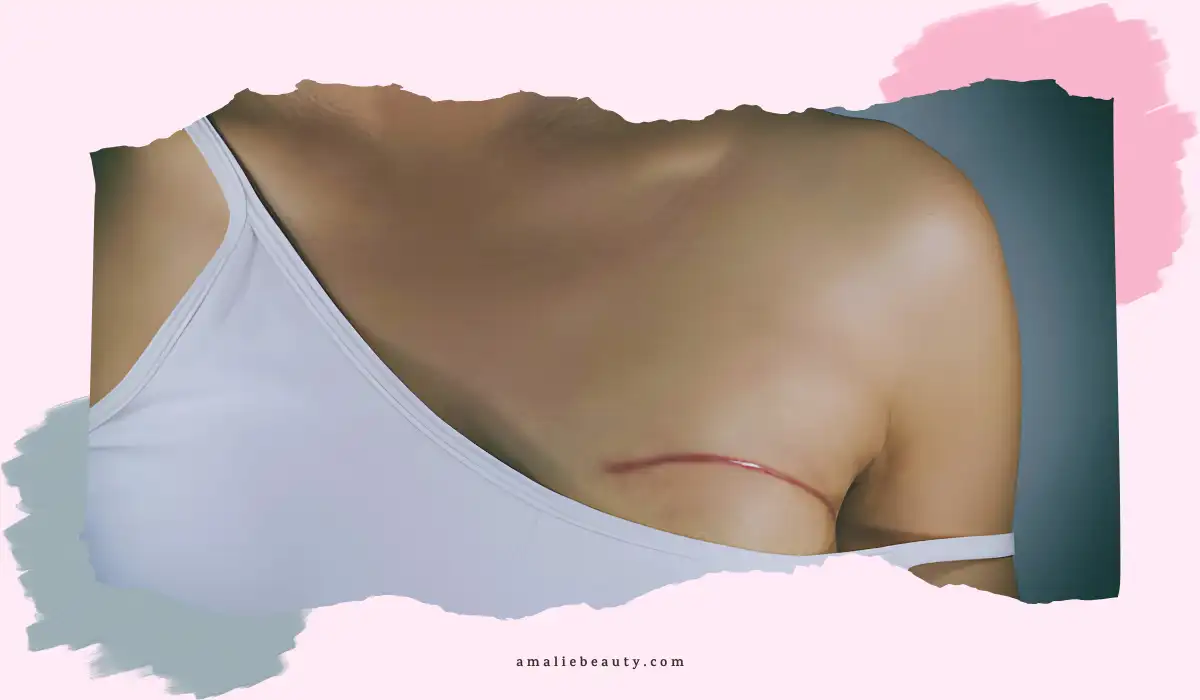For many women with overly large breasts, a breast reduction surgery can provide relief from physical and emotional burdens. However, like any major procedure, breast reductions do result in scarring. So, will breast reduction scars go away?
While scars may alarm some considering this surgery, it’s important to understand that breast reduction scars heal and tend to fade significantly over time. And there are many treatments available to help minimize their appearance during the healing process.
This article provides an overview of what to expect with breast reduction scars, aftercare tips to promote healing, and the most effective scar reduction approaches to help you achieve the best possible outcome. We’ll also answer a common question for those considering surgery: will breast reduction scars go away?
Normal Healing And Fading Of Scars

It’s completely normal to have noticeable scarring around the breasts, underarms, and possibly near the areola following reduction surgery.
The procedure requires surgical incisions to remove excess tissue, reposition the nipples higher on the chest, and reshape the breast shape. Stitches are used to close these incisions.
Initially after surgery, scars will likely appear pink or red, slightly raised, and possibly itchy. This is simply part of the body’s natural healing response as new collagen forms at the incision sites. Scars from any surgery follow a maturation process that occurs over one to two years.
During this time, scars generally tend to flatten out and fade in color. By year two, breast reduction scars are typically white or skin-toned and far less conspicuous.
However, genetics play a role in how visible scarring may remain long-term. Those prone to raised, thick scars called keloid or hypertrophic scars may require more intensive scar reduction treatment.
Aftercare For Healthy Healing
Properly caring for incisions during recovery can promote wound healing and minimize visible scarring. Here are some important aftercare tips to follow:
- Wear recommended compression garments day and night for the first six weeks. Compression helps reduce fluid buildup and prevent excess scar tissue formation.
- Once approved by your surgeon, apply a gentle moisturizer like vitamin E oil daily for at least three months. Hydrating scars keeps them smooth and pliable.
- Avoid exposing scars to the sun for at least one year. Use sunscreen for protection. UV exposure can darken scars and impede healing.
- Follow your surgeon’s guidelines on when you can resume strenuous activity and breast support after surgery. Protecting delicate incisions helps optimal healing.
Breast Reduction Scars Treatment Approaches
For women unhappy with lingering, raised scars, there are also effective scar reduction treatments to further minimize appearance. Options include:
✅ Silicone Sheeting or Gel
Using a silicone-based product for 8 to 12 hours a day puts gentle pressure on scars to flatten them and keep them hydrated. Results are gradual over several months.
✅ Steroid Injections
For raised or thickened scars, a series of cortisone injections into the scar tissue helps soften and flatten it by suppressing the body’s inflammatory response. Several treatments are often necessary for the best results.
✅ Laser Skin Resurfacing
Using repeated precision laser energy along the scar’s surface removes the outer damaged skin layers. It will also prompt the development of new, healthy skin cells and collagen.
The collagen will help to smooth and reshape scar tissue and blend its appearance with the surrounding skin. Minimal downtime is needed between treatments.
✅ Surgical Revision
In some cases of severe, protruding scars not responsive to more conservative treatments, surgical excision followed by stitches to close the wound may sufficiently minimize the appearance of the scar.
Will My Breast Reduction Scars Ever Completely Disappear?
While scarring is an inevitable part of breast reduction surgery, there are many reassuring factors around the outcomes: surgical techniques result in minimal, easily hidden incisions; breast reduction scars healed tend to fade significantly in one to two years; and optional scar reduction treatments can further improve their appearance long term.
Most women find their scars an acceptable tradeoff for finally finding comfort with a breast size proportional to their body. So while some light scarring may remain to some degree, it does tend to be minimally visible and is rarely a significant concern.
With realistic expectations around scarring, and utilizing scar reduction options as desired during recovery, visible scarring can be effectively minimized for overall excellence in appearance after breast reduction surgery.
Conclusion
Deciding to undergo breast reduction surgery understandably brings up questions and concerns about the resultant scarring.
While scarring is unavoidable, most find the short and long-term effects on appearance to be acceptable and less bothersome than initially feared.
While likely never fully disappearing, scars often fade to thin white lines blending fairly imperceptibly into the skin’s canvas.
Ultimately, scarring concerns prove manageable for most women through reliable surgical techniques, proper healing protocols, and the option of scar revision methods.
If you prepare realistically for scarring post-breast reduction surgery, the positive impacts of newly shaped, uplifted, and comfortable breasts can make remnants of light scarring worthwhile.
So taking comfort in knowing concerns about scarring need not be an obstacle to improving comfort and confidence through breast reduction surgery, as various effective options exist to safely minimize their appearance. Will you still have reservations about scarring, or feel ready to pursue your goals of living unburdened by overly large breasts?
Reference
- Longaker MT, et al.(2015). A randomized controlled trial of the embrace advanced scar therapy deviceto reduce incisional scar formation. DOI:
https://dx.doi.org/10.1097%2FPRS.0000000000000417

